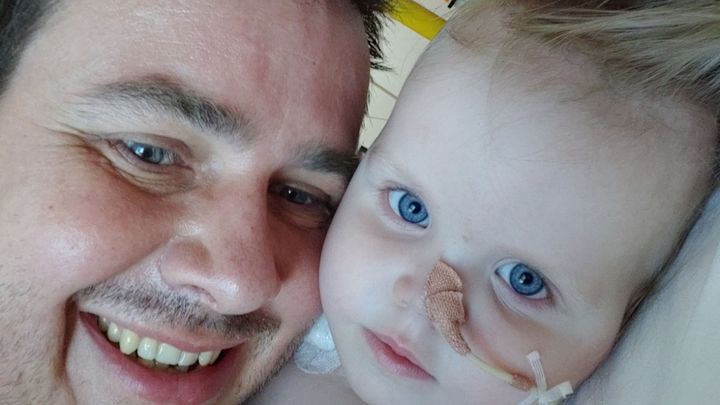
Let Luna shine
Donation protected
Born on the 1st of January 2017, Luna Sia was always gonna be exceptional, we just didn't know how exceptional her life story will become.
Luna's story can also be read in French , Portuguese , German and Slovene .
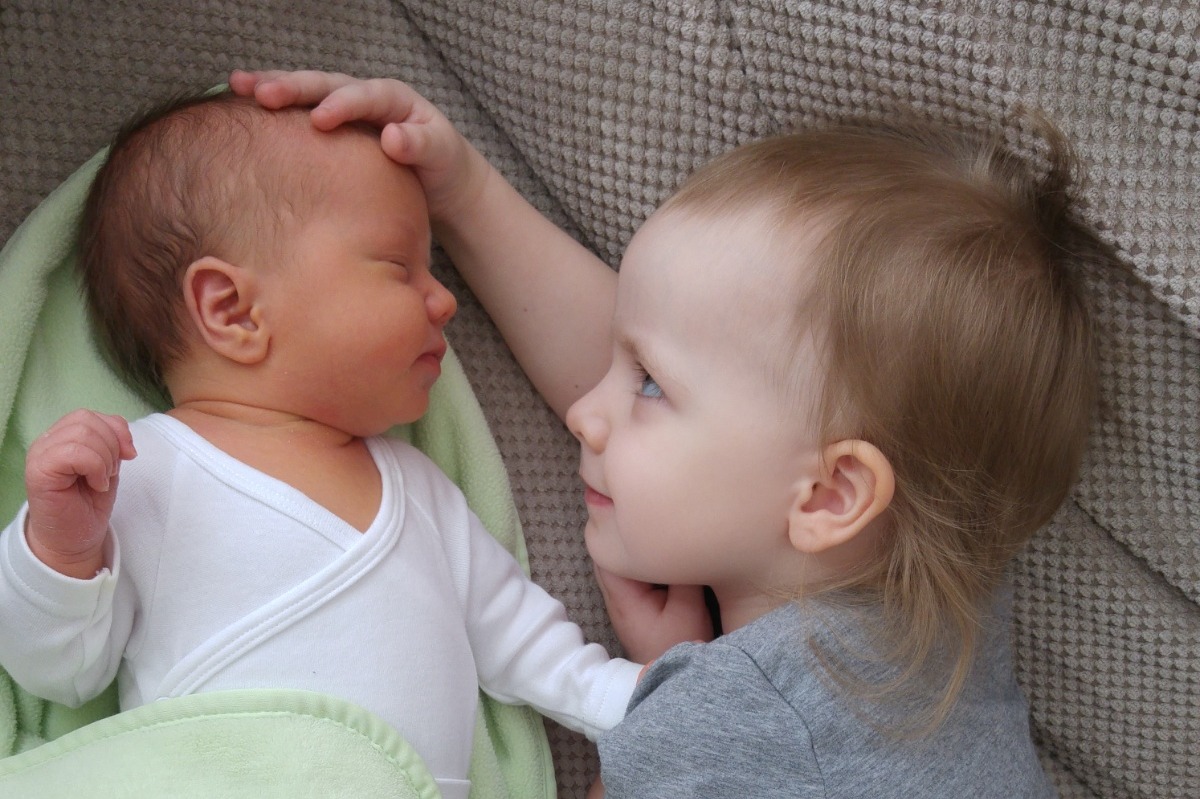 A few days old Luna Sia and her older sister Aya Indigo
A few days old Luna Sia and her older sister Aya Indigo
During a regular visit at the pediatrician at the age of 6 months, we were told that her urine contains high amount of proteins. Two days later she was admitted at the nephrology department of the pediatric clinic in Ljubljana, Slovenia. The first diagnosis was asymptomatic nephrotic syndrome. As a precaution, doctors decided to treat her condition with corticostereoid therapy (Medrol). We were informed about the potential side effects but were hoping for quick results.
 Already in the hospital (at the age of six months)
Already in the hospital (at the age of six months)
Her condition was identified as genetic and extremely rare (<30 registered cases worldwide). It didn't clearly fall in either congenital or infantile category, meaning there is no literature or suggested treatments.
Unfortunately there were no results, just side effects, starting from hormonal changes (affecting growth), excessive swelling and ophthalmic problems (glaucoma) to name a few. At the time we were not only fighting the disease but also the therapy's side effects.
 Excessive swelling as one of the side effects of the Medrol therapy
Excessive swelling as one of the side effects of the Medrol therapy
 Glaucoma, also caused by the Medrol therapy
Glaucoma, also caused by the Medrol therapy
After three months the Medrol therapy was discontinued due to lack of results and increased number of complications caused by the drug's side effects. At this point Luna already had several medical interventions behind her, lumbar puncture, general anesthesia and MRI scanning among others, fighting off the undesired side effects.
In a desperate attempt to stop her kidneys from failing, the doctors opted for another aggressive immunosuppressive therapy with the tachrolimus drug. Due to her immune system being suppressed we lived an isolated life in order not to expose Luna to infections. Even catching a common cold could potentially be a life threatening situation. She was now spending more time at the hospital than at home.

After nine months of unsuccessful aggressive immunosuppressive therapy, the doctors gave up. She was now receiving medications only to help managing her secondary health problems (anemia, acidosis...). According to the doctors the end stage renal disease, commonly known as kidney failure, was inevitable and not far.
Then came a week when she rapidly started gaining weight - two kilos over a matter of a few days. We knew something was off and took Luna to the hospital. Her clinical picture was off the chart as a result of the progressive kidney failure. She was immediately admitted and for a week the doctors tried containing the situation but it was all in vain. Her refusing to take the medications orally was now putting her life in danger and the doctors had to insert a NG (nasogastric) tube.
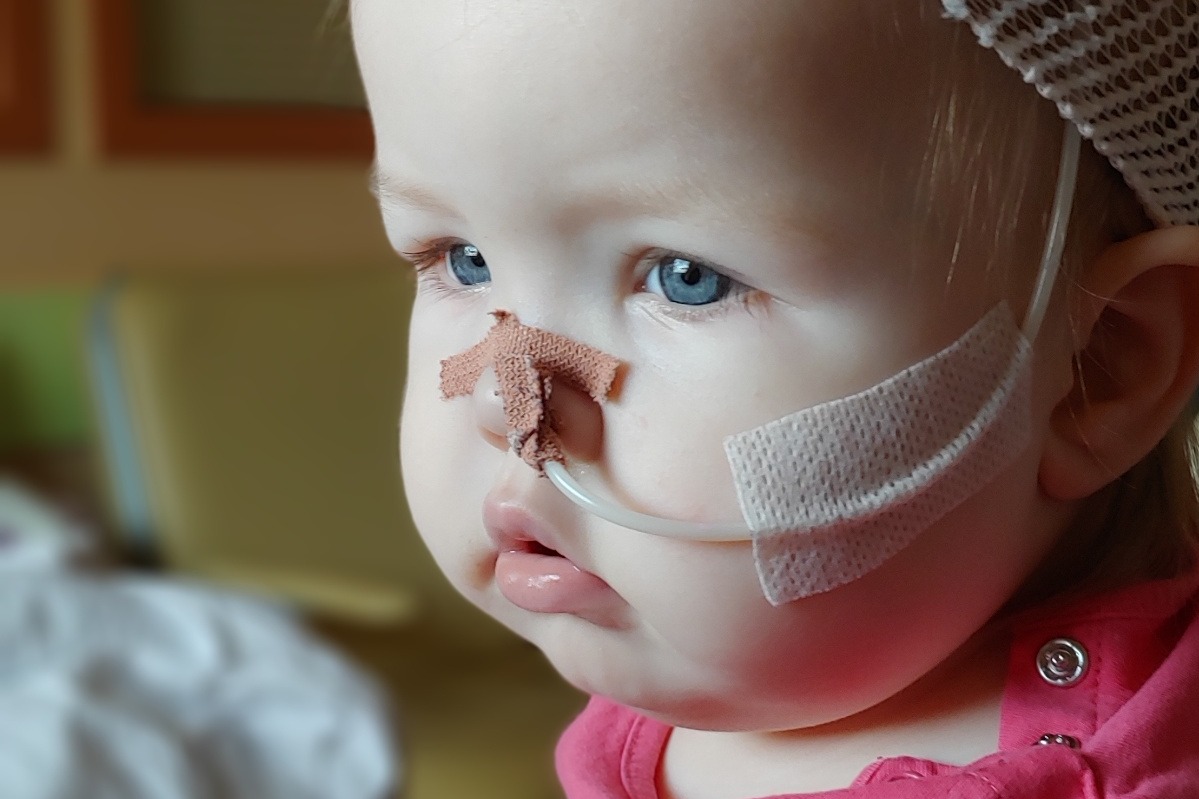
The following week Luna had to be admitted to the intensive care unit for an urgent hemodialysis, her kidneys have now failed completely and her body was retaining all fluids.
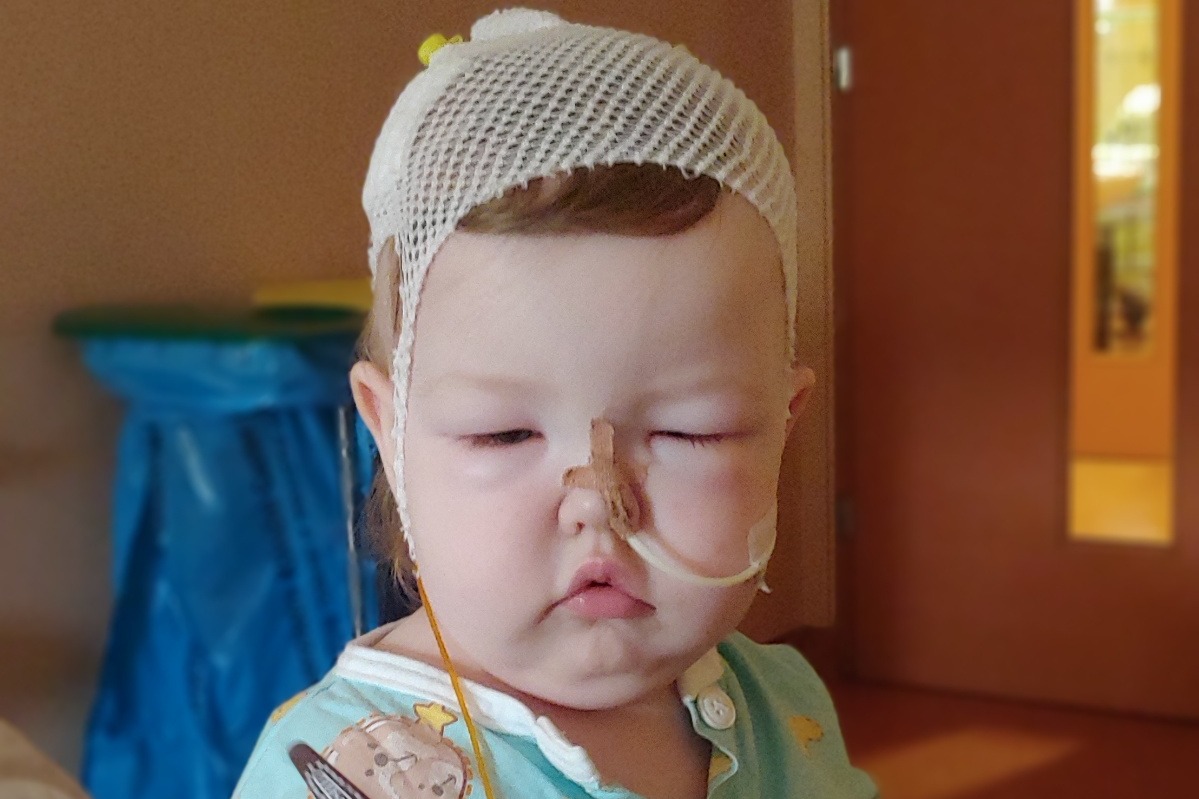 Excessive swelling due to fluid retention
Excessive swelling due to fluid retention
In spite of living in the situation for a year, the admittance to the intensive care unit came as a shock. At a certain point she was plugged to approximately 20 tubes. The urgency and severeness of her condition, the paralyzing helplessness we felt as the parents and her pain and fear over the next two weeks were exhaustive. During the continuous 10-day hemodialysis an excess of 3 liters of fluid was removed from her body - she was admitted with 14 kilos, by the time she was dismissed from the ICU, she had 10.8 kilos.
 Two nerve wrecking weeks in the ICU
Two nerve wrecking weeks in the ICU
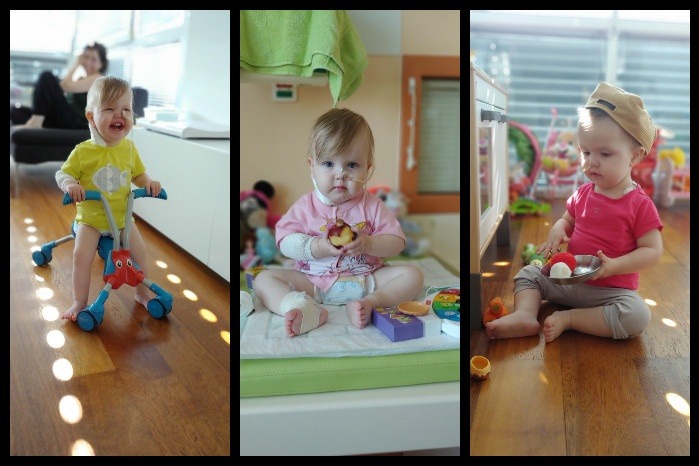 In spite of the severity, Luna doesn't let her condition bring her down
In spite of the severity, Luna doesn't let her condition bring her down
At the moment the kidneys are not functional. After having spent two weeks in the ICU she started rejecting food and she is now feed through NG tube exclusively. The fluid intake has to be controlled and the dialysis is needed daily to remove the excess fluids. The venous catheter in her neck was removed after three weeks once the inserted peritoneal catheter was ready for use. In order to assure access to her veins (after a year of continuous use her veins are almost gone), a Peripherally Inserted Central Catheter (PICC line) was inserted as well. There was a necessity for all of these punctures but each and single one of them exposed her body to potential infectious complications.
Luna is now 21-months old, has a peritoneal catheter and needs to perform a 12-hour dialysis daily. She is fed through the NG tube exclusively. We are looking at a six months period in which she will receive all the necessary vaccinations and undergo thorough examinations for her to be put on the transplant list. Once she is listed, the estimated waiting time for a suitable donor graft (kidney organ) is between 6 and 12 months.

Her mom Carina has suspended the writing of her PhD thesis the day Luna was diagnosed. She is her 24/7 nurse ever since. Aya Indigo, Luna's older sister's also affected and is growing up faster due to our family situation. Luna's father Gorazd is the sole breadwinner and the past fifteen months have exhausted the family's financial reserves.
Before the transplant occurs we want to have her feeding on her own. We have found a tube weaning institution with >95% success rate. We also want to continue with the alternative healing along with the conventional medicine - the results of the sessions she had were notable. We want to offer Luna a good life and for that we need your help.
Luna's story can also be read in French , Portuguese , German and Slovene .
 A few days old Luna Sia and her older sister Aya Indigo
A few days old Luna Sia and her older sister Aya IndigoDuring a regular visit at the pediatrician at the age of 6 months, we were told that her urine contains high amount of proteins. Two days later she was admitted at the nephrology department of the pediatric clinic in Ljubljana, Slovenia. The first diagnosis was asymptomatic nephrotic syndrome. As a precaution, doctors decided to treat her condition with corticostereoid therapy (Medrol). We were informed about the potential side effects but were hoping for quick results.
 Already in the hospital (at the age of six months)
Already in the hospital (at the age of six months)Her condition was identified as genetic and extremely rare (<30 registered cases worldwide). It didn't clearly fall in either congenital or infantile category, meaning there is no literature or suggested treatments.
Unfortunately there were no results, just side effects, starting from hormonal changes (affecting growth), excessive swelling and ophthalmic problems (glaucoma) to name a few. At the time we were not only fighting the disease but also the therapy's side effects.
 Excessive swelling as one of the side effects of the Medrol therapy
Excessive swelling as one of the side effects of the Medrol therapy Glaucoma, also caused by the Medrol therapy
Glaucoma, also caused by the Medrol therapyAfter three months the Medrol therapy was discontinued due to lack of results and increased number of complications caused by the drug's side effects. At this point Luna already had several medical interventions behind her, lumbar puncture, general anesthesia and MRI scanning among others, fighting off the undesired side effects.
In a desperate attempt to stop her kidneys from failing, the doctors opted for another aggressive immunosuppressive therapy with the tachrolimus drug. Due to her immune system being suppressed we lived an isolated life in order not to expose Luna to infections. Even catching a common cold could potentially be a life threatening situation. She was now spending more time at the hospital than at home.

After nine months of unsuccessful aggressive immunosuppressive therapy, the doctors gave up. She was now receiving medications only to help managing her secondary health problems (anemia, acidosis...). According to the doctors the end stage renal disease, commonly known as kidney failure, was inevitable and not far.
Then came a week when she rapidly started gaining weight - two kilos over a matter of a few days. We knew something was off and took Luna to the hospital. Her clinical picture was off the chart as a result of the progressive kidney failure. She was immediately admitted and for a week the doctors tried containing the situation but it was all in vain. Her refusing to take the medications orally was now putting her life in danger and the doctors had to insert a NG (nasogastric) tube.

The following week Luna had to be admitted to the intensive care unit for an urgent hemodialysis, her kidneys have now failed completely and her body was retaining all fluids.
 Excessive swelling due to fluid retention
Excessive swelling due to fluid retentionIn spite of living in the situation for a year, the admittance to the intensive care unit came as a shock. At a certain point she was plugged to approximately 20 tubes. The urgency and severeness of her condition, the paralyzing helplessness we felt as the parents and her pain and fear over the next two weeks were exhaustive. During the continuous 10-day hemodialysis an excess of 3 liters of fluid was removed from her body - she was admitted with 14 kilos, by the time she was dismissed from the ICU, she had 10.8 kilos.
 Two nerve wrecking weeks in the ICU
Two nerve wrecking weeks in the ICU In spite of the severity, Luna doesn't let her condition bring her down
In spite of the severity, Luna doesn't let her condition bring her downAt the moment the kidneys are not functional. After having spent two weeks in the ICU she started rejecting food and she is now feed through NG tube exclusively. The fluid intake has to be controlled and the dialysis is needed daily to remove the excess fluids. The venous catheter in her neck was removed after three weeks once the inserted peritoneal catheter was ready for use. In order to assure access to her veins (after a year of continuous use her veins are almost gone), a Peripherally Inserted Central Catheter (PICC line) was inserted as well. There was a necessity for all of these punctures but each and single one of them exposed her body to potential infectious complications.
Luna is now 21-months old, has a peritoneal catheter and needs to perform a 12-hour dialysis daily. She is fed through the NG tube exclusively. We are looking at a six months period in which she will receive all the necessary vaccinations and undergo thorough examinations for her to be put on the transplant list. Once she is listed, the estimated waiting time for a suitable donor graft (kidney organ) is between 6 and 12 months.

Her mom Carina has suspended the writing of her PhD thesis the day Luna was diagnosed. She is her 24/7 nurse ever since. Aya Indigo, Luna's older sister's also affected and is growing up faster due to our family situation. Luna's father Gorazd is the sole breadwinner and the past fifteen months have exhausted the family's financial reserves.
Before the transplant occurs we want to have her feeding on her own. We have found a tube weaning institution with >95% success rate. We also want to continue with the alternative healing along with the conventional medicine - the results of the sessions she had were notable. We want to offer Luna a good life and for that we need your help.
Organizer
Gorazd Kozmus
Organizer